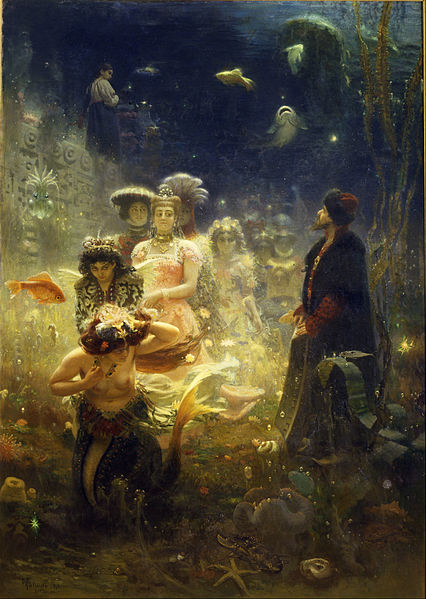Summary | Excerpt | Reviews | Beyond the Book | Read-Alikes | Genres & Themes | Author Bio

This article relates to The Story of Russia
 The bylina, an Old Russian form of epic poetry or song, is referenced in The Story of Russia by Orlando Figes, in which the author notes its ideological significance.
The bylina, an Old Russian form of epic poetry or song, is referenced in The Story of Russia by Orlando Figes, in which the author notes its ideological significance.
The word "bylina" (plural: byliny) has its origins in the Russian "byl," translating as "that which happened." Byliny began to be printed and popularized in the 17th century, although they had been around since the 10th century as a form of oral verse, possibly having been established by court minstrels or peasant singers. Kiev, the capital city of Kievan Rus (a commonwealth-style East Slavic state founded in the 9th century) is generally believed to be where the bylina emerged, though scholars have also cited other possible places of origin, including the principalities of Galicia-Volhynia and Rostov-Suzdal.
In the tradition of oral verse, byliny are designed to be memorable. Crafted with a fixed number of strong stresses per line, they are believed to have been traditionally performed by a narrator, sometimes spoken and sometimes sung, and accompanied by a gusli, a harp-like instrument.
Byliny tell tales of national identity, quests, defense from invasions, magic and loyalty to Prince Volodymyr of Kiev, a real historical figure that modern-day Russians and Ukrainians both claim as their own, among other subjects. Tales in byliny may be loosely based on historical fact, but also draw on mythological characters and creatures, and their heroes (bogatyrs) undertake incredible feats in dramatic settings such as epic battles and underwater kingdoms.
Some early byliny tend to be more primarily mythological, drawing from elements of Eastern Slavic mythology, with gods, slaying of dragons and the like. A cycle of epic byliny referred to as the "Kievan" series pivots around the court of Prince Volodymyr, who tasks bogatyrs with fighting injustice and protecting the land and the people. One of the most famous bogatyrs to appear is the great warrior Ilya Muromets; other bogatyrs associated with this cycle are the dragon-slayer Dobryna Nikitich and the young trickster Alyosha Popovich. The "Novgorod" series is characterized by Sadko, a successful merchant and master of the gusli. In 1896, Sadko became the subject of an opera by Rimsky-Korsakov.
The bylina has died out as a literary form since the spread of literacy, but it continues to be studied and preserved as a cultural and historical source; and although folkloric, its quasi-historical nature means that it is open to exploitation for propaganda purposes.
Retouched version of 1876 painting of the hero Sadko in an underwater kingdom by Ilya Repin (State Russian Museum), via Google Arts & Culture
Filed under Music and the Arts
![]() This "beyond the book article" relates to The Story of Russia. It originally ran in September 2022 and has been updated for the
September 2023 paperback edition.
Go to magazine.
This "beyond the book article" relates to The Story of Russia. It originally ran in September 2022 and has been updated for the
September 2023 paperback edition.
Go to magazine.




If every country had to write a book about elephants...
Click Here to find out who said this, as well as discovering other famous literary quotes!
Your guide toexceptional books
BookBrowse seeks out and recommends the best in contemporary fiction and nonfiction—books that not only engage and entertain but also deepen our understanding of ourselves and the world around us.